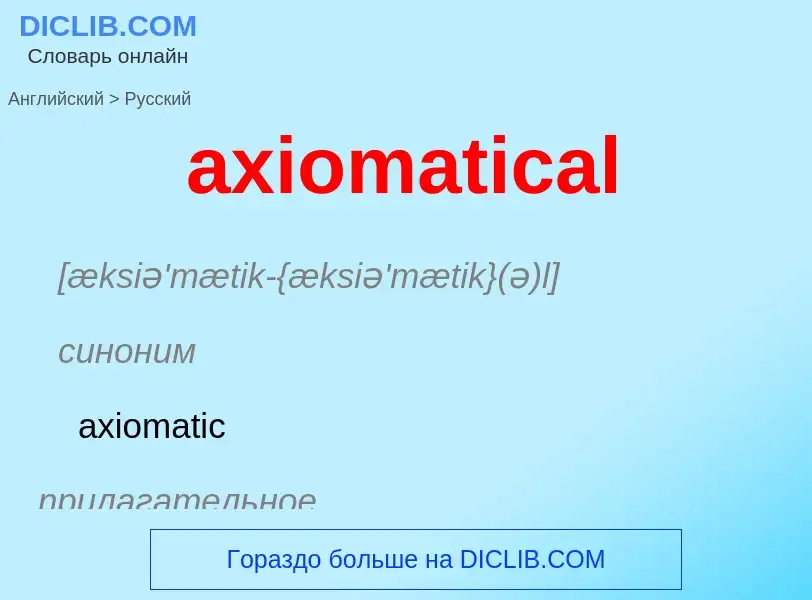Traducción y análisis de palabras por inteligencia artificial
En esta página puede obtener un análisis detallado de una palabra o frase, producido utilizando la mejor tecnología de inteligencia artificial hasta la fecha:
- cómo se usa la palabra
- frecuencia de uso
- se utiliza con más frecuencia en el habla oral o escrita
- opciones de traducción
- ejemplos de uso (varias frases con traducción)
- etimología
axiomatical - traducción al Inglés
[æksiə'mætik-{æksiə'mætik}(ə)l]
синоним
прилагательное
общая лексика
аксиоматический
самоочевидный
не требующий доказательств
['pɔstjulit]
общая лексика
принимать без доказательства, постулировать
аксиома
постулат
постулативный
постулировать
существительное
['pɔstjuleit]
книжное выражение
постулат
математика
аксиома
редкое выражение
требование
предварительное условие
глагол
общая лексика
теоретически допускать
требовать
обусловливать
ставить условием
постулировать, принимать без доказательства
обусловливать, ставить условием
книжное выражение
постулировать
синоним
Wikipedia
An axiom, postulate, or assumption is a statement that is taken to be true, to serve as a premise or starting point for further reasoning and arguments. The word comes from the Ancient Greek word ἀξίωμα (axíōma), meaning 'that which is thought worthy or fit' or 'that which commends itself as evident'.
The precise definition varies across fields of study. In classic philosophy, an axiom is a statement that is so evident or well-established, that it is accepted without controversy or question. In modern logic, an axiom is a premise or starting point for reasoning.
In mathematics, an axiom may be a "logical axiom" or a "non-logical axiom". Logical axioms are taken to be true within the system of logic they define and are often shown in symbolic form (e.g., (A and B) implies A), while non-logical axioms (e.g., a + b = b + a) are substantive assertions about the elements of the domain of a specific mathematical theory, such as arithmetic.
Non-logical axioms may also be called "postulates" or "assumptions". In most cases, a non-logical axiom is simply a formal logical expression used in deduction to build a mathematical theory, and might or might not be self-evident in nature (e.g., the parallel postulate in Euclidean geometry). To axiomatize a system of knowledge is to show that its claims can be derived from a small, well-understood set of sentences (the axioms), and there are typically many ways to axiomatize a given mathematical domain.
Any axiom is a statement that serves as a starting point from which other statements are logically derived. Whether it is meaningful (and, if so, what it means) for an axiom to be "true" is a subject of debate in the philosophy of mathematics.

